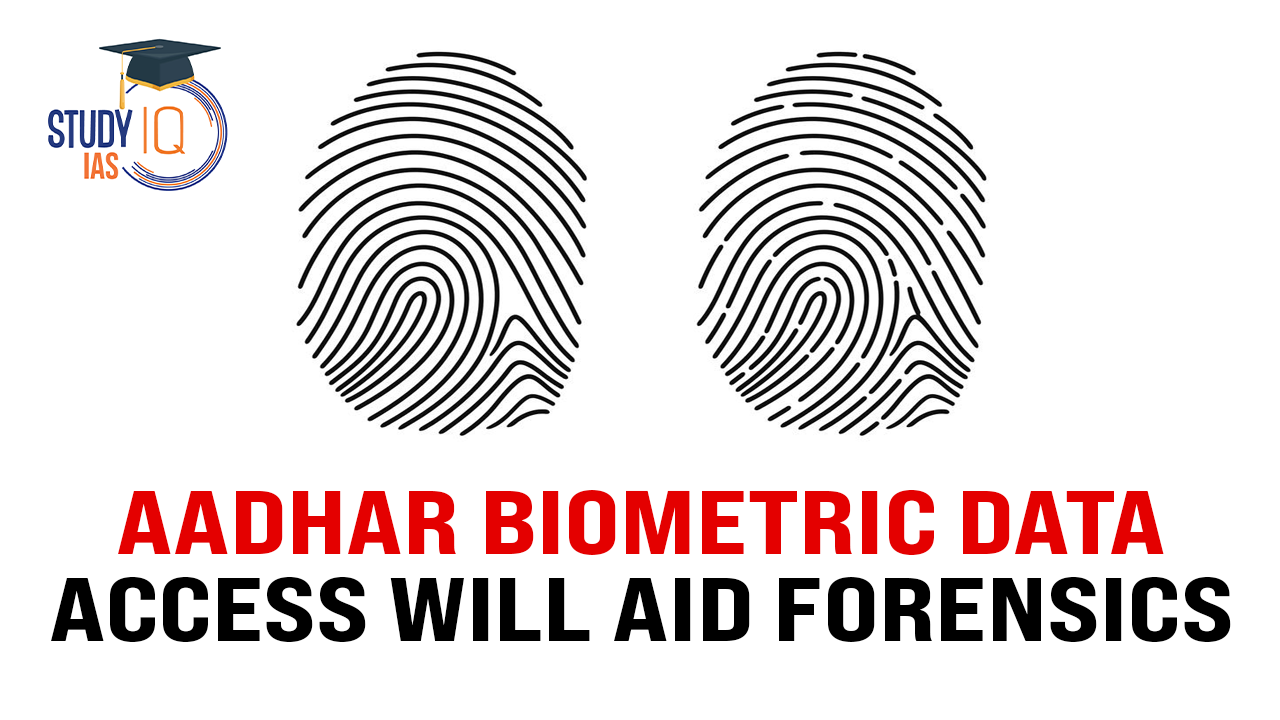Table of Contents
Regulations on Data Disclosure
- The Unique Identification Authority of India (UIDAI) has strict regulations about the disclosure of data in order to protect a person’s right to privacy and ensure that there is no misuse of personal data.
- Section 33(1) of the Aadhaar Act allows the disclosure of certain information under an order of a court not inferior to that of a High Court judge.
- Sections 29(1) and 33 of the Aadhaar Act explicitly state that core biometric information (fingerprints and iris scans) cannot be disclosed under any circumstances.
Hurdles Faced by Police Investigations
- Lack of Access to Biometric Data: The Aadhaar Act complicates the identification process for deceased individuals.
- This restriction means that police cannot utilise potentially vital fingerprint data that could lead to identifying victims and facilitating investigations.
- Limited Fingerprint Databases: Current police fingerprint databases primarily consist of records from individuals with known criminal histories.
- Many states have not digitised these records which makes it difficult to cross-reference data efficiently.
Standard Investigative ProceduresWhen an unidentified body is discovered, police typically follow these steps: ● Examination and Documentation: The body is examined, photographed, and distinctive features (tattoos, scars) are noted. ● Evidence Collection: Scene evidence is collected, CCTV footage analysed, and phone records checked if available. ● Fingerprint Analysis: Fingerprints are collected and sent to fingerprint bureaus for matching against criminal records. |
- Investigative Delays: The inability to quickly access biometric data can lead to delays in identifying victims, which may hinder timely investigations into possible homicides or other crimes.
Court Rulings on Treatment of Deceased Bodies● A number of rulings by High Courts and the Supreme Court of India have highlighted the need for respectful and humane treatment of bodies. ○ E.g., Courts have addressed issues such as the inhumane practice of keeping a prisoner’s body hanging for an extended period after death during an execution (as outlined in certain prison manuals), as well as the need to ensure the respectful repatriation of the bodies of migrant workers who die abroad. |
Populations Most Affected
The individuals who suffer the most from these restrictions are often those from marginalised backgrounds:
- Economically Disadvantaged Individuals: Many unidentified bodies belong to daily wage workers, migrants, or homeless individuals who lack identification documents and have strained family ties.
- Vulnerable Groups: These include people with mental health issues or those living in precarious conditions, making them more susceptible to becoming unidentified victims due to their transient lifestyles.
- Social Isolation: Individuals from strained family relationships are less likely to have missing person reports filed, exacerbating the issue of unidentified bodies.
Potential Benefits of Accessing Aadhaar Data
Allowing police access to Aadhaar biometric data could yield several benefits:
- Enhanced Identification Capabilities: Accessing fingerprint data could significantly improve the chances of identifying deceased individuals, thereby providing closure to families and enabling proper last rites.
- Improved Investigation Efficiency: Quick identification through biometric matching can facilitate more effective investigations into homicides and other crimes, potentially leading to timely justice for victims.
- Public Safety Enhancement: By identifying victims promptly, law enforcement can address public safety concerns more effectively and prevent future crimes.
Proposed Disclosure Mechanisms
To balance privacy concerns with the need for effective policing, a well-defined disclosure mechanism is essential:
- Court Orders Based on FIRs: Allow access based on a jurisdictional judicial magistrate’s order after verifying an FIR regarding an unidentified body (per Section 194 of the Bharatiya Nagarik Suraksha Sanhita). This could streamline processes and reduce the burden on higher courts.
- Clear Protocols for Privacy: Restrict access strictly to deceased individuals and ensure data cannot be misused.
- Accountability: Police requests should include documented reasons for Aadhaar access to ensure responsible use of data.


 New Window of Opportunity for India amid...
New Window of Opportunity for India amid...
 Cetacean Morbillivirus: Meaning, Feature...
Cetacean Morbillivirus: Meaning, Feature...
 Transforming a Waste-Ridden Urban India:...
Transforming a Waste-Ridden Urban India:...

























